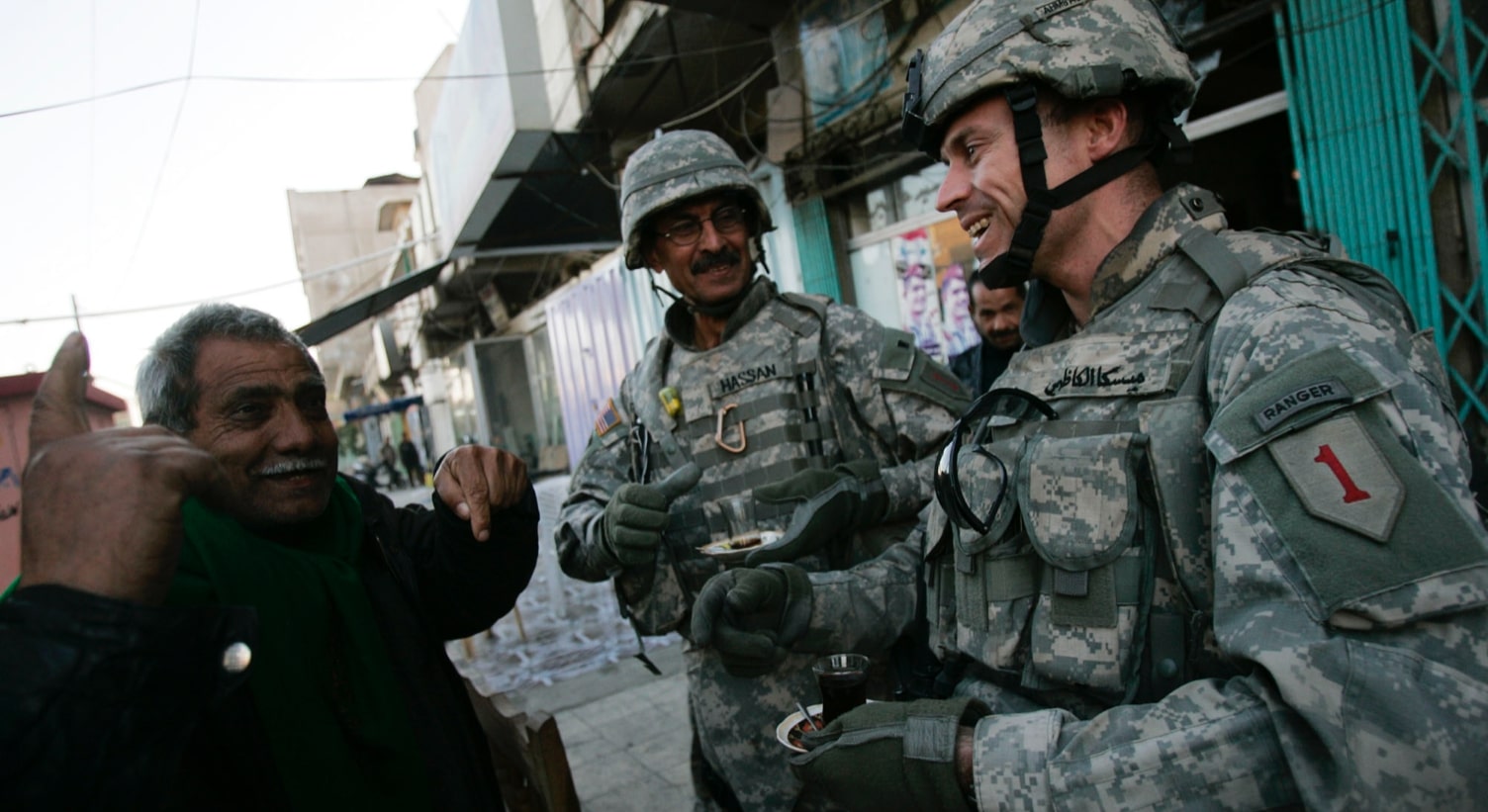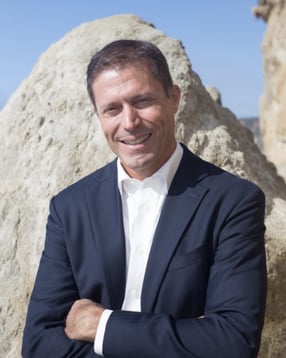Soft Networks: The Front Lines of Peacebuilding

Steve Miska (right), on the streets of Baghdad with his interpreter, Hassan. Photo credit: Chris Hondros, Getty Images, 2007
The following post is contributed by Steve Miska, Principal Investigator for Strategically Protecting Soft Networks™ (SPSN), a project supported by the Pacific Council on International Policy in L.A. and numerous other partners to protect vulnerable allies who work with Americans in conflict zones. This summer, Kroc School Master’s in Peace and Justice student Alek Ball interned with SPSN and, upon his return, shared anecdotes of his experience with fellow students, faculty, and staff. Fascinated by what we learned, we contacted Miska for more information about the origins of SPSN and his experience working closely with Ball…
In late 2006 I led a small team in Khadamiyah, a sensitive Shia religious location in Baghdad, Iraq. The height of sectarian cleansing, Shia militia committed atrocities against Sunnis as retribution for al Qaeda attacks on population centers. Given that the conflict qualified as a civil war, even though nobody in the U.S. government would use that term, the people who partnered with our forces took extreme risks. When they started to get killed for working alongside my team, we decided to do something to protect them.
Our only option at the time was a newly authorized Special Immigrant Visa to send interpreters who worked faithfully to the United States. By the time I left Baghdad in late 2007, my team had processed about three dozen interpreters through what we called the Underground Railroad from Baghdad to Amman, Jordan, and on to America. While this situation seemed dire and unique to my experience at the time, I later realized that it was an age-old problem. Vietnam veterans relate similar stories to those shared by Afghan and Iraq war veterans today.
Soft Networks Threatened, and the Action We’re Taking
Adversaries of the United States continue to undermine efforts in conflict zones by targeting U.S. soft networks, or local national partners. Military leaders and diplomats have few policy tools at their disposal to insulate those networks, and many times, do not anticipate the attacks until their closest partners quit, flee or are found dead.
Given the likelihood that enemies will continue to pursue a logical strategy to target soft networks, the Departments of Defense, State and other organizations should have policy options to proactively insulate critical partners abroad. The project to Strategically Protect Soft NetworksTM (SPSN) began as a result of the policy gap in U.S. national security. The University of San Diego has been a vital partner for over two years.
In 2016 I continued research and outreach to further my 2011 thesis work at the College of International Security Affairs (CISA), National Defense University, in Washington D.C. With the support of No One Left Behind, I was able to work with partners in the nonprofit arena, academia, the think tank community, and government to explore potential options for policy development.
In 2018 the project received a grant to accelerate the research and policy development effort. With a west coast and east coast presence, SPSN has been able to engage key stakeholders in government and nontraditional areas to explore policy ideas that would better insulate soft networks abroad.
Project research mines for best practices from government and other sectors to protect local national partners during contingency operations. Research focuses on innovative means of identity protection and relocation, when necessary. For example, researchers from Berkeley have been examining best practices for masking identity online to train government officials, local nationals and contracting agencies.
Given that the preponderance of local national partners get hired by government contractors, the project team looks for ways to raise awareness within that community of stakeholders as well. We have recently presented on the topic in both Los Angeles and Washington, D.C.
Other research delves into the scope of the strategic challenge by cataloguing former interpreters and other partners who have been killed, wounded or forced to flee. Shalinda Sprehn, a USD Kroc School researcher, performed substantive work in this area.
In addition to Shalinda’s work, Kroc School student Alek Ball furthered that research this summer in Washington, D.C. at CISA. Alek explored how other countries protected their interpreters, examined international legal obligations, and recommended a threat assessment system to better understand local national risks when working along U.S. forces or diplomats.
Next Steps and Learnings
Future research revolves around systematically cataloguing the scope of the threat against soft networks, furthering best practices from arenas like nongovernment organizations that operate in conflict zones, the media, and domestic law enforcement designed to insulate vulnerable people like battered spouses or witness protection selectees. Interns, junior fellows and researchers benefit from real world impact. SPSN research has the potential to save lives.
While strategically protecting soft networks has clear moral implications, better policy would also impact salient national security interests. Failing to insulate local-national partners weakens U.S. military ability to successfully operate in theater. Adversaries intentionally target soft networks, thereby directly degrading U.S. national security. Here are a handful of examples:
- Trust is eroded between military personnel and their local-national partners. Military personnel and contracted local-nationals form close bonds due to high-stakes situations and frequent time spent together. By not protecting former contractors, current relationships weaken due to lack of confidence in U.S. ability to protect its closest partners.
- Potential informants in theater become less willing to cooperate with law enforcement officials who seek to investigate terror attacks. If locals feel as though the United States cannot protect them, they are less willing to risk safety by cooperating with American law enforcement.
- Host nation security forces lose confidence in American forces when the US military cannot protect local-nationals that go on patrol with them every day.
- Failure to protect our closest partners undermines diplomatic narratives and impacts economic and political development, in addition to security.
- Veterans return to the US feeling as if they violated an ethos of leave no one behind, abandoning their most trusted partners to adversaries.
The project to Strategically Protect Soft NetworksTM continues to promote proactive policy to insulate our most important partners in conflict zones. Our research provides team members with the opportunity to have real world impact in foreign policy. Researchers and interns gain exposure to senior policy makers, academics, and outstanding networking opportunities. Other benefits include publishing possibilities, mentorship and potential references. SPSN has research opportunities in Washington, D.C. and Los Angeles, primarily. However, researchers can also work remotely from universities or other professional locations.
If you are interested in joining the team, please contact Ms. Jamie Haag, Director of Research, by email at jlhaag.spsn@gmail.com or contact Kajsa Hendrickson (hendricksonkk@sandiego.edu) at USD’s Kroc School for a project description.
About the Author

Steve Miska is the Principal Investigator for Strategically Protecting Soft Networks™, a project supported by the Pacific Council on International Policy in L.A. and numerous other partners to protect vulnerable allies who work with Americans in conflict zones. As Director of First Amendment Voice, he leads a nonpartisan effort to reinvigorate civic awareness around free expression, religious liberty, press freedom and other first amendment issues. He retired as a Colonel after 25 years in the Army. His last assignment was teaching three years as the Army Chair at Marine Corps University. Previously, he served in the White House as Director for Iraq on the National Security Council. In 2007, on his second of three combat tours, Steve led a team that established an underground railroad for dozens of interpreters from Baghdad to Amman to the United States. He earned top academic honors as a Counterterrorism Fellow at the College of International Security Affairs and has taught economics at the United States Military Academy, West Point. Steve routinely speaks on soft networks and has addressed DIA, RAND, the Pacific Council on International Policy, the Young Presidents Organization of LA, and numerous media outlets and think tanks. He holds degrees from Cornell University, National Defense University, and West Point. He serves as an advisor to several nonprofits, including No One Left Behind, the International Refugee Assistance Project, and the i5 Freedom Network.
Contact:
Justin Prugh
jprugh@sandiego.edu
(619) 260-7573

About the Author
The Joan B. Kroc School of Peace Studies (Kroc School) at the University of San Diego is the global hub for peacebuilding and social innovation. Founded in 2007, the Kroc School equips the next generation of innovative changemakers to shape more peaceful and just societies. We offer master's degrees in peace and justice, social innovation, humanitarian action, conflict management and resolution, and a dual degree in peace and law — programs that have attracted diverse and dynamic students from more than 50 countries. In addition to our graduate programs, the Kroc School is home to the Kroc Institute for Peace and Justice (Kroc IPJ). Founded in 2001, the Institute supports positive change beyond the classroom. Through groundbreaking research, experiential learning, and forward-thinking programs, the Kroc School and Kroc IPJ are shaping a future in which peaceful co-existence is the new normal.





